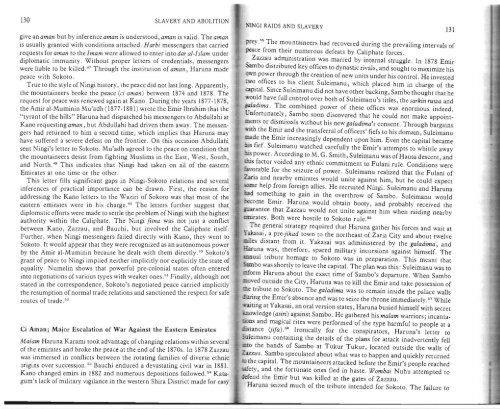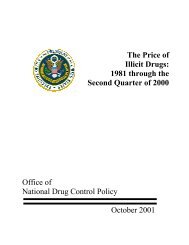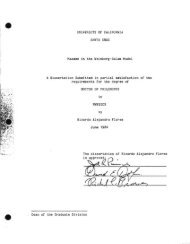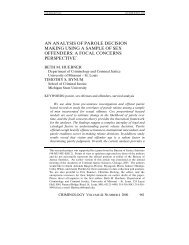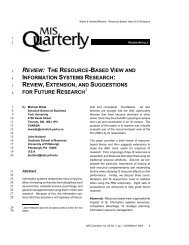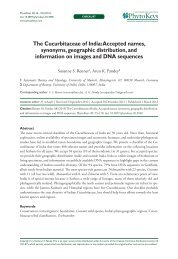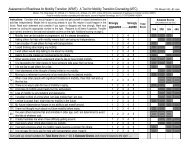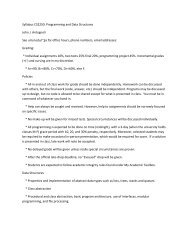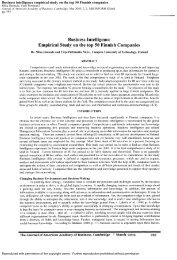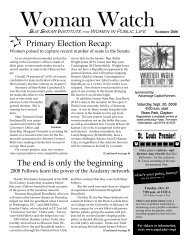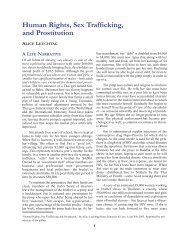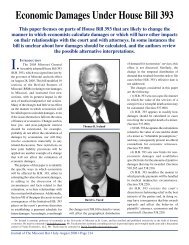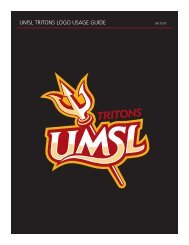Ningi Raids and Slavery in Nineteenth Century Sokoto Caliphate
Ningi Raids and Slavery in Nineteenth Century Sokoto Caliphate
Ningi Raids and Slavery in Nineteenth Century Sokoto Caliphate
You also want an ePaper? Increase the reach of your titles
YUMPU automatically turns print PDFs into web optimized ePapers that Google loves.
130 SLAVER Y AND ABOLITION<br />
give an amGll bur by <strong>in</strong>ferenceaman is underslOod" G1natl is valid. The Q1~all<br />
is usually granted with conditions attached. HaTh,. messengers that carned<br />
requests for amall to (he Imam were allowed to enter <strong>in</strong>(od~r al-/ slam under<br />
diplomatic immunity. Without proper letters of credentials, messengers<br />
wert: li i:lble to be killed ..<br />
n<br />
Through [he <strong>in</strong>stitution of amall, Haruna made<br />
peace with <strong>Sokoto</strong>.<br />
True [0 [he style of<strong>N<strong>in</strong>gi</strong> hislOry, the peace did not last long. Apparently,<br />
the mounta<strong>in</strong>eers broke the peace (ci aman) between 1874 <strong>and</strong> 1878. The<br />
request [or peace was renewed aga<strong>in</strong> at Kana. Dur<strong>in</strong>g the years 1877·l878,<br />
the Amir al-Mum<strong>in</strong><strong>in</strong> Mu'adh ( 1877 -1 881 ) wrote the Emir Ibrahim that the<br />
"tyrant of the hills" Har una had dispatched his messe ngers to Abdullahl at<br />
Kana request<strong>in</strong>g amaTl , but Abdullahi had driven them away. The messenge<br />
rs had returned 10 him a second time , which imp~ie s tha~ Haruna ma~<br />
have suffered a severe defeat on the frontier. On this occaSIOn Abdullahi<br />
sent <strong>N<strong>in</strong>gi</strong>'s letter to <strong>Sokoto</strong>. l\1u 'adh agreed to the peace on condition thai<br />
the mounta<strong>in</strong>eers desist from fight<strong>in</strong>g Muslims <strong>in</strong> the East , West, South,<br />
<strong>and</strong> North. 48 This <strong>in</strong>dicates that <strong>N<strong>in</strong>gi</strong> had taken on all of the eastern<br />
Emirates a( one time or the other.<br />
This lette r fill s signjficant gaps <strong>in</strong> <strong>N<strong>in</strong>gi</strong>-<strong>Sokoto</strong> relations <strong>and</strong> several<br />
<strong>in</strong>ferences of practical importance can be drawn. First, (he reason for<br />
address<strong>in</strong>g the Kano letters to the Waziri of <strong>Sokoto</strong> was that most of the<br />
eastern emirates were <strong>in</strong> his charge..~9 The letters further suggest that<br />
diplomatic efforts were made to settle the.pr~blem of<strong>N<strong>in</strong>gi</strong> w.ith the high~st<br />
authority with<strong>in</strong> the Calirhate. The Nmgl fima was not J~ st a co.nOlct<br />
between Kana , Zazzau, <strong>and</strong> Bauchi, but <strong>in</strong>volved the <strong>Caliphate</strong> llself.<br />
Further, when <strong>N<strong>in</strong>gi</strong> messengers failed directly with Kana) they well[ to<br />
Sakata. It would appear that they were recogn~z ed as an a.utono~~us pow~r<br />
by the Amir al-Mum<strong>in</strong><strong>in</strong> because he dealt with them dlfeclly. <strong>Sokoto</strong> s<br />
grant of peace to <strong>N<strong>in</strong>gi</strong> implied neither implicitly nor explIcitly the state of<br />
equality. Numel<strong>in</strong> sho.ws that po~erful pre-colon~~1 s.tates oftcn emered<br />
<strong>in</strong>to ncgotiations of varIOUS types with weaker ones. F<strong>in</strong>ally). alt~oug~ ~ot<br />
stated <strong>in</strong> the correspondence) Sokato's negotiared peace carried Implicnly<br />
the resumption of normal trade relations <strong>and</strong> sanctioned the respect for safe<br />
routes of trade.!I:t<br />
Ci Aman; Major Escalation of War Aga<strong>in</strong>st the Eastern Emirates<br />
Malam Haruna Karami took advantage of chang<strong>in</strong>g relations with<strong>in</strong> several<br />
of the emirates <strong>and</strong> broke the peace at the end of the 1870s. ln l878 Zalzau<br />
was immersed <strong>in</strong> conflicts between the rotat<strong>in</strong>g families of diverse ethnIC<br />
orig<strong>in</strong>s over succession .. 5 :l Bauchi endured a devast.a~<strong>in</strong>g civi l war i~~ 188lo<br />
Kana changed emirs <strong>in</strong> 1882 <strong>and</strong> numerous depOSItIOns followed . Katagum's<br />
lack of military vigilance <strong>in</strong> the western Shira District made for easy<br />
XING! RAIDS AND SLAVERY<br />
;rcy.!)~ The mounta<strong>in</strong>eers had recovered dur<strong>in</strong>g the prevail<strong>in</strong>g <strong>in</strong>tervals of<br />
peace from their numerous defeats by <strong>Caliphate</strong> forces.<br />
Zazzau adm<strong>in</strong>is tration was marred by <strong>in</strong>ternal s truggle. In 1878 Emir<br />
5ambo distributed key offices to dynastic ri vals, <strong>and</strong> sought to maximize his<br />
.).wn power through the creation of new units under his control. He <strong>in</strong>vested<br />
:wo offices to his client Suleimanu, which placed him <strong>in</strong> charge of the<br />
.::apital. S<strong>in</strong>ce Suleimanu did not have other back<strong>in</strong>g, Sambo thought that he<br />
'iiIOQu ld have full control over both of Suleimanu's titles, the sarki11 ruwa <strong>and</strong><br />
galadima. The comb<strong>in</strong>ed power of these offices was enormous <strong>in</strong>deed.<br />
Unfortunately, Sambo soon discovered that he could not make appo<strong>in</strong>t<br />
:::Dents or dismissals without his new galadima's consent . Through barga<strong>in</strong>s<br />
ith the Emir <strong>and</strong> the transferral of officers' fiefs to his doma<strong>in</strong>. Suleimanu<br />
made the Emir <strong>in</strong>creas<strong>in</strong>gly dependent upon him. Even the capi tal became<br />
:tis lief. Suleimanu watched carefully the Emir's attempts to whittle away<br />
- power. Accord<strong>in</strong>g to M. G. Smith, Suleimanu wasofHausa descent, <strong>and</strong><br />
rltis factor voided any ethnic commitment to Fulani rule. Conditions were<br />
iivorable for the seizure of power. Suleimanu realized that the Fulani of<br />
Zaria <strong>and</strong> nearby emirates would unite aga<strong>in</strong>st him, but he could expect<br />
JOIIle help from foreign allies. He recruited <strong>N<strong>in</strong>gi</strong>. Suleimanu <strong>and</strong> Haruna<br />
.::ad someth<strong>in</strong>g to ga<strong>in</strong> <strong>in</strong> the overthrow of Sambo. Suleimanu would<br />


